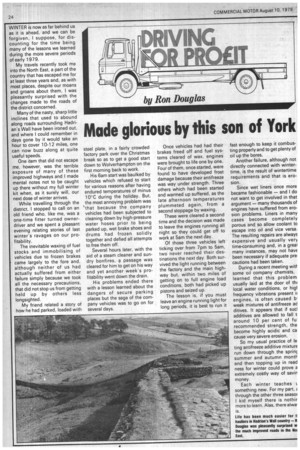Made glorious by this son of York
Page 26

If you've noticed an error in this article please click here to report it so we can fix it.
WINTER is now as far behind us as it is ahead, and we can be forgiven, I suppose, for discounting for the time being many of the lessons we learned during the more severe periods of early 1979.
My travels recently took me into the North East, a part of the country that has escaped me for at least three years and, as with most places, despite our moans and groans about them, I was pleasantly surprised with the changes made to the roads of the district concerned.
Many of the nasty, sharp little inclines that used to abound along roads surrounding Hadrian's Wall have been ironed out, and where I could remember in days gone by it would take an hour to cover 10-12 miles, one can now buzz along at quite useful speeds.
One item that did not escape me, however, was the terrible exposure of many of these improved highways and I made mental notes not to be caught up there without my full winter kit when, as it surely will, our next dose of winter arrives.
While travelling through the district, I stopped to call on an old friend who, like me, was a one-time fitter turned ownerdriver and we spent a pleasant evening relating stories of last winter's ravages on our profitability.
The inevitable waxing of fuel stocks and immobilising of vehicles due to frozen brakes came largely to the fore and, although neither of us had actually suffered from either failure simply because we took all the necessary precautions, that did not stop us from getting held up by others less longsighted.
My friend related a story of how he had parked, loaded with
steel plate, in a fairly crowded factory park over the Christmas break so as to get a good start down to Wolverhampton on the first morning back to work.
His 6am start was baulked by vehicles which refused to start for various reasons after having endured temperatures of minus 10°C during the holiday. But, the most annoying problem was that because the company vehicles had been subiected to cleaning down by high-pressure water hoses prior to being parked up, wet brake shoes and drums had frozen solidly together and defied all attempts to free them off.
Several hours later, with the aid of a steam cleaner and sundry bonfires, a passage was cleared for him to get on his way and yet another week's profitability went down the drain.
His problems ended there with a lesson learned about the dangers of secure parking places but the saga of the company vehicles was to go on for several days. Once vehicles had had their brakes freed off and fuel systems cleared of wax, engines were brought to life one by one. Four of them, once started, were found to have developed frost damage because their antifreeze was way under strength. Three others which had been started and warmed up suffered, as the late afternoon temperatures plummeted again, from a second stoppage by waxing.
These were cleared a second time and the decision was made to leave the engines running all night so they could get off to work at 5am the next day.
Of those three vehicles left ticking over from 7pm to 5am, two never reached their destinations the next day. Both survived the light running between the factory and the main highway but, within two miles of getting on to full engine load conditions, both had picked up pistons and seized up.
The lesson is, if you must leave an engine running light for long periods, it is best to run it
fast enough to keep it combusting properly and to get plenty of oil up the bores,
Another failure, although not directly connected with wintertime, is the result of wintertime requirements and that is erosion.
Since wet liners once more became fashionable — and I do not want to get involved in that argument — many thousands of engines have suffered from erosion problems. Liners in many cases become completely porous and so allow coolant to escape into oil and vice versa. The resulting repairs are always expensive and usually very time-consuming and, in a greai many instances, may not havE been necessary if adequate pre. cautions had been taken.
During a recent meeting wit some oil company chemists, learned that this problem usually laid at the door of thf local water conditions, or higl frequency vibrations present ii engines, is often caused Ix weak mixtures of antifreeze ad ditives. It appears that if sucl additives are allowed to fall ti around 10 per cent of ful recommended strength, the become highly acidic and ca cause very severe erosion.
So my usual practice of le ting antifreeze additive mixture run down through the sprinc
summer and autumn month and then topping .up in read
ness for winter could prove a extremely costly way of savin money.
Each winter teaches t. something new. For my part, z.
through the other three seasor I kid myself there is nothir more to learn. Alas, there alwa.
is.
Lite has been much easier tor ti hauliers in Hadrian's Wall country — R Douglas was pleasantly surprised w the much improved roads in the Noi East.




































































































